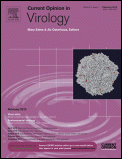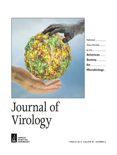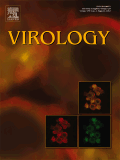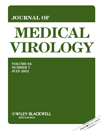
Advances in Virology
Scope & Guideline
Fostering Collaboration for Viral Breakthroughs
Introduction
Aims and Scopes
- Molecular Virology:
Research focusing on the molecular mechanisms of viral replication, pathogenesis, and interactions with host cells. This includes studies on viral genomes, proteins, and the cellular response to viral infections. - Epidemiology and Public Health:
Investigations into the epidemiological trends of viral infections, including outbreak studies and surveillance data. This area also encompasses studies on vaccination efficacy and public health interventions. - Antiviral Drug Development:
Exploration of new antiviral agents and therapeutic strategies against viral infections. This includes in vitro and in vivo studies evaluating the efficacy of potential treatments. - Viral Genotyping and Characterization:
Research dedicated to the genetic characterization of various viruses, including the identification of strains and variants, which is critical for understanding transmission patterns and guiding vaccine development. - Impact of Environmental Factors on Viral Transmission:
Studies examining how environmental conditions affect the transmission dynamics of viruses, including the role of aerosols and surface contamination in viral spread.
Trending and Emerging
- COVID-19 Research:
An overwhelming surge in studies related to SARS-CoV-2, including its variants, epidemiology, and treatment strategies. This theme reflects the urgent need for understanding and combating the ongoing pandemic. - Plant-Based Antiviral Agents:
Emerging interest in natural products and plant metabolites as potential antiviral agents, showcasing innovative approaches to drug discovery in virology. - Immunological Responses to Vaccination:
Increased focus on understanding immune responses to viral vaccines, particularly in the context of new variants and population-specific responses, which is crucial for effective vaccination strategies. - Molecular Epidemiology:
A growing trend towards integrating molecular techniques in epidemiological studies to track viral infections and outbreaks at a granular level, enhancing public health responses. - Viral Pathogenesis and Host Interactions:
Heightened investigations into how viruses interact with host cellular mechanisms, including the role of immune evasion and pathogenicity, which is vital for developing targeted therapies.
Declining or Waning
- Animal Virology:
Research on viruses affecting animals has decreased, possibly due to a shift in focus towards human viral diseases, particularly in the context of the COVID-19 pandemic. - Traditional Diagnostic Techniques:
There is a noticeable reduction in studies employing older diagnostic methods for viral detection, as newer, more efficient technologies such as rapid antigen tests and molecular assays gain prominence. - Non-Communicable Disease Associations:
Research linking viral infections to non-communicable diseases has waned, possibly overshadowed by urgent investigations into viral infections directly impacting public health, such as COVID-19.
Similar Journals

VIRAL IMMUNOLOGY
Unraveling the complexities of viral interactions with immune systems.Viral Immunology, published by Mary Ann Liebert, Inc, stands as a prominent journal dedicated to advancing the understanding of the interplay between viral infections and host immune responses. With a strong focus on immunology, molecular medicine, and virology, the journal provides a platform for the dissemination of high-quality research findings and innovative methodologies that could shape the future of these critical fields. Although it currently holds a Q3 rating across its relevant categories and a respectable ranking within the Scopus database, Viral Immunology continues to strive for excellence with a commitment to publishing influential research that informs both academic and clinical practices. The journal accepts submissions in various formats—original research, reviews, and commentaries—catering to a diverse readership that includes researchers, professionals, and students engaged in the biological and medical sciences. Readers can anticipate insightful articles that address urgent challenges in immunological responses to viral infections, paving the way for new therapeutic strategies and public health initiatives.

Frontiers in Virology
Advancing the Frontiers of Viral ResearchFrontiers in Virology, published by FRONTIERS MEDIA SA, is an innovative open-access journal dedicated to advancing the understanding of viral biology, pathogenesis, surveillance, and control strategies. With the rapid evolution of viral threats, this journal serves as a critical platform for researchers, professionals, and students to disseminate and access high-quality research, reviews, and perspectives in virology. The journal places a strong emphasis on interdisciplinary approaches, promoting collaborative efforts that drive breakthroughs in the field. While the specific impact factor and H-index details are currently unavailable, Frontiers in Virology is committed to rigorous peer review and integrity in scientific publishing. Authors and readers will benefit from the extensive reach provided by open access, making groundbreaking insights available to a global audience, thus contributing significantly to the ongoing dialogue in virology and public health.

Journal of Clinical Virology Plus
Exploring the frontiers of viral diagnostics and therapies.The Journal of Clinical Virology Plus, published by Elsevier, is an essential resource for researchers and professionals in the fields of virology and infectious diseases. Launched in 2021, this journal aims to bridge the gap between clinical research and application, fostering a deeper understanding of viral pathogenesis, diagnostics, and therapeutic strategies. With an ISSN of 2667-0380, this open-access journal brings cutting-edge findings to the global scientific community, facilitating the rapid dissemination of knowledge critical for advancing public health. Positioned in the Q3 category for both Infectious Diseases and Virology in 2023, its ranking reflects its growing influence and relevance in the academic landscape. The journal strives to support innovative research, collaborative studies, and comprehensive reviews that address contemporary challenges in clinical virology. As it converges through the years from 2021 to 2024, Journal of Clinical Virology Plus aims to be a central hub for vital discussions and breakthroughs in this dynamic field.

ARCHIVES OF VIROLOGY
Exploring the frontiers of virology research.Archives of Virology is a prestigious academic journal dedicated to the field of virology, published by Springer Wien. Established in 1975, this journal has been a crucial platform for disseminating innovative research findings and advancements in the understanding of viral diseases and their impact on human health. It holds a notable position in the academic landscape, with a 2023 impact factor placing it in Q2 within the field of Medicine (miscellaneous) and Q3 in Virology. Its Scopus ranking within the Virology category further underscores its relevance, with a notable percentile of 45th. Although it does not provide Open Access options, the journal's rigorous peer-review process ensures the highest quality of published work, making it an essential resource for researchers, professionals, and students aiming to stay updated in the rapidly evolving field of virology. For those committed to advancing their understanding of viruses and viral diseases, Archives of Virology is a vital scholarly resource.

Current Opinion in Virology
Bridging Research and Application in VirologyCurrent Opinion in Virology, published by Elsevier Science Ltd, is a premier journal dedicated to advancing knowledge in the dynamic field of virology. Established as a respected source of comprehensive reviews and critical evaluations, this journal boasts an impressive impact factor and has achieved a distinguished Q1 category ranking for virology, signifying its pivotal role in the academic community. Serving researchers, professionals, and students alike, Current Opinion in Virology presents insightful contributions that delve into the latest developments, emerging trends, and pivotal challenges facing virology today. With its Scopus ranking placing it in the top 15% of its field, the journal provides unparalleled access to cutting-edge research that informs both basic and applied aspects of virology. Although not an open-access journal, it offers options for subscriptions that ensure accessibility to critical content. As the field continuously evolves, Current Opinion in Virology remains at the forefront, bridging the gap between research and clinical application, making it an essential resource for all in the virology community.

Journal of Virology
Shaping the Future of Viral TherapeuticsJournal of Virology is a premier scholarly journal dedicated to advancing the field of virology, focusing on the molecular mechanisms of virus-host interactions, viral pathogenesis, and the latest therapeutic and vaccine developments. Published by the American Society for Microbiology, this esteemed journal has been a cornerstone for researchers since its inception in 1967, providing a platform for high-quality, peer-reviewed research. With a commendable impact factor indicative of its relevance and influence, the journal is categorized in the top quartile (Q1) for Virology, Microbiology, and Insect Science, reflecting its significance in these fields. Researchers can access a wealth of studies and findings that shape our understanding of viruses and their interactions with hosts, highlighting its role in both basic and applied sciences. Positioned in the United States, the Journal of Virology serves a global audience, ensuring that cutting-edge discoveries reach professionals, students, and academics alike. Join the conversation as we explore the complexities of virology and its implications for human health and disease.

VIROLOGY
Illuminating the Impact of Viruses on HealthVirology, published by Academic Press Inc. Elsevier Science, is a prominent journal dedicated to advancing the knowledge and understanding of viral biology and pathogenesis since its inception in 1955. With a distinguished impact factor and recognized as a Q2 journal in the field of Virology for 2023, it ranks 38 out of 80 in the Scopus database for Immunology and Microbiology, placing it in the 53rd percentile among similar publications. This esteemed journal provides a platform for groundbreaking research, critical reviews, and comprehensive studies that contribute to our global understanding of viruses and their impact on health and disease. Although currently not an open-access journal, it remains accessible to a wide audience of researchers, professionals, and students who are keen to explore the latest advancements in virological research. The journal's scope encompasses a diverse range of topics, ensuring that it serves as an essential resource for anyone engaged in virology and related biomedical fields.

JOURNAL OF MEDICAL VIROLOGY
Cutting-edge Insights: Your Gateway to the Latest in Virology.JOURNAL OF MEDICAL VIROLOGY is a prestigious academic publication dedicated to advancing the field of virology and infectious diseases. Published by WILEY, this journal has established itself as a cornerstone within the scientific community since its inception in 1977, and it will continue to provide cutting-edge research until 2024. With an impressive impact factor that places it in the Q1 quartile for both Infectious Diseases and Virology, the journal ranks 14 out of 344 in Medicine - Infectious Diseases and 6 out of 80 in Immunology and Microbiology - Virology according to Scopus metrics. Its focus encompasses a broad spectrum of topics, including viral pathogenesis, diagnostics, treatment strategies, and epidemiology, making it an essential resource for researchers, clinicians, and students alike. Although not an open-access journal, it provides valuable insights and accessible content for subscribers and libraries. The ongoing commitment to high-quality peer-reviewed articles makes JOURNAL OF MEDICAL VIROLOGY a vital platform for disseminating knowledge and fostering innovation in virology and related fields.

ACTA VIROLOGICA
Exploring the evolving landscape of infectious diseases.ACTA VIROLOGICA, a key journal in the field of virology and infectious diseases, is published by FRONTIERS MEDIA SA in Slovakia, serving the global scientific community with groundbreaking research since its inception in 1957. This esteemed journal, identified by ISSN 0001-723X and E-ISSN 1336-2305, provides a platform for rigorous peer-reviewed articles that contribute significantly to our understanding of viral pathogens and their implications in medicine. Positioned within the Q3 category for both Infectious Diseases and Miscellaneous Medicine, and a Q4 category for Virology in 2023, ACTA VIROLOGICA offers crucial insights into the evolving landscape of virology research. With its robust accessibility options, this journal appeals to a diverse readership, including researchers, healthcare professionals, and students, fostering a collaborative environment to advance the field of virology. The editorial objective is to enhance the catalog of knowledge pertaining to viruses, promoting innovative approaches in prevention, diagnostics, and treatment. Located at AVENUE DU TRIBUNAL FEDERAL 34, LAUSANNE CH-1015, SWITZERLAND, ACTA VIROLOGICA continues to be a vital resource in the collective efforts to combat viral disease challenges.

Virology Journal
Connecting researchers to enhance our understanding of virology.Virology Journal, published by BMC, stands as a prominent open-access platform since 2004, dedicated to advancing the field of virology and infectious diseases. With its E-ISSN: 1743-422X, this journal is based in the United Kingdom and strives to disseminate high-quality research that enhances our understanding of viral pathogens and their interactions with hosts. Recognized with a Q1 classification in the category of Infectious Diseases and a Q2 in Virology for 2023, Virology Journal holds significant standing in the academic community, ranking #82/344 in Medicine - Infectious Diseases and #26/80 in Immunology and Microbiology - Virology. Its commitment to open access ensures that cutting-edge research is freely available to researchers, professionals, and students worldwide, fostering collaboration and innovation in the fight against viral diseases. The journal aims to publish original research articles, reviews, and commentaries that will stimulate discourse and spark new ideas within the virology community.